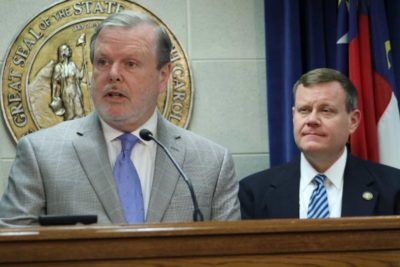A compromise between the House and Senate budget plans has finally dropped tonight. The $24 billion proposal takes some elements from both chambers’ plans when laying out spending for the next two years in education.
While the spending plan was hailed earlier today by House Speaker Tim Moore, R-Cleveland, as a “great budget,” others aren’t so sure.
“From what we’ve seen, this is a bad budget that has the wrong priorities. It spends more on corporate tax breaks instead of significantly higher teacher pay. It includes a slush fund that promises projects that may never be built rather than using a school bond at today’s historically low interest rates to help build new schools responsibly,” said Ford Porter, spokesperson for Gov. Roy Cooper. “And it fails to do anything to close the coverage gap that would make health care more accessible for working people. North Carolina families deserve a better budget.”
At a press conference earlier in the day, legislative Republicans criticized Cooper for trying to delay the release of the budget and not offering counter proposals to their plans.
“We’ve waited until the last possible moment to move forward this budget,” said President Pro Tempore, Phil Berger, R-Rockingham.
Senate Democratic Leader Dan Blue, D-Wake, also weighed in after the press conference this afternoon. In a statement, he says that Democrats have plainly stated their desire for Medicaid expansion, an end to corporate tax cuts, and a statewide school construction bond.
“The conference report fails to acknowledge any of these; and it makes clear that Republicans don’t understand the value of finding common ground,” he wrote in the statement.
So, what’s in the compromise budget proposal?
Under the plan, teachers will get an average 3.9% pay raise over the biennium, but those raises heavily favor veteran teachers.
Teachers from 0-15 years of experience would only be getting their normal step increases. The real salary increases come in the higher years of experience. Teachers from 16-20 years of experience will be getting a $500 raise in both years of the biennium. Teachers from 21-24 years of experience will get a $1,500 raise in the first year and a $500 raise in the second year. Teachers with 25 or more years of experience will be getting a $600 raise in the first year and a $500 raise in the second year. They will also receive bonus checks in the amount of $500 in October of both years. The pay increases all start in July as usual. The House budget proposal had called for pay increases to start mid-year, but that plan was nixed in the final budget compromise.
This plan contrasts with both the House and Senate’s previous plans.
The Senate plan offered a 3.5% average increase for teachers over two years, while the House offered an average 6.3%. The House plan also heavily emphasized veteran teachers. However, it started its pay raises mid-year, bringing the average percent increase in the first year down lower than presented by lawmakers.
The compromise budget increases pay for principals but does not restructure the principal pay schedule as the House’s plan did. In fact, the compromise budget plan basically adopts the Senate’s version of principal pay raises.


The principal pay raise under the compromise budget amounts to an average 6.2% increase in pay for principals, in contrast to the House’s average 10% pay increase (which would have been lower in the first year due to the House starting their pay raises mid-year). The compromise budget extends the hold harmless for principals who may have made more under previous principal pay schedules.
The budget also keeps the Senate plan to offer an incentive plan that will give principals $30,000 to run a low-performing school in the bottom 5% of performance in the state.
The budget compromise does not include the restoration of Master’s pay, as the House’s plan did, nor does it include the cuts to supplemental funding of Cooperative Innovative High Schools — including early college high schools — as the Senate’s plan did. The budget does include a provision restricting the State Board of Education from approving more than four new Cooperative Innovative High Schools a year if those schools are seeking the supplemental funding. Additionally, the opening of any new approved schools is contingent on the General Assembly appropriating additional funds for them within one calendar year. The school cannot open unless that contingency is fulfilled, and if it’s not, the school can resubmit a revised application — ostensibly without a request for the supplemental funds. This new law takes effect for schools applying to open in the 2020-21 school year.
The budget also provides an additional $1.5 million recurring for Cooperative Innovative High Schools in both years of the biennium.
The final budget compromise also does not mess with the formula for school performance grades, as the House wanted in its budget plan. The formula will stay weighted 80/20 in favor of academic performance over academic growth. The budget does include a provision keeping the school performance grades on a 15-point scale. They have always been on such a scale, but they were slated to move to a 10-point scale next year, which could have resulted in an influx of newly-named low-performing schools.
The budget compromise also favors the Senate’s pay-as-you-go plan for funding the state’s excessive school construction needs. While it wasn’t included in its budget plan, the House had hoped to put a bond on the referendum to pay for education construction costs. Instead, the budget compromise will provide about $4.4 billion over 10 years for K-12 school construction and repair alone, using money from the public school capital fund, needs-based capital funding, and the State Capital and Infrastructure Fund.
The compromise budget provides an extra $15 million for classroom supplies, just as both the House and the Senate did. It also includes a plan to give teachers money directly to pay for classroom supplies. Under the compromise, teachers would get $150 each in the first year and $200 each in the second year to buy their own supplies.
The House had planned to give teachers $145 each, while the Senate’s original plan included $300 each to teachers.
When it comes to community colleges, both the House and Senate plan included more money for some of the big-ticket items sought by the system office.
The budget compromise fully funds the short-term workforce development program. It basically matches the Senate version, which gave about $12 million in both years for the program. The House plan, on the other hand, gave about $8 million in the first year and $11.5 million in the second year.
This item is of particular importance to community college leaders because there is a disconnect between funding for curriculum programs at community colleges and the short-term, workforce-related programs, with the latter getting shortchanged in comparison. This extra funding would help the system to reach parity.
For career coaches, the budget compromise also gives more money to the community colleges. The budget includes $1.7 million recurring in the first year and $2.3 million recurring in the second year. The program provides coaches who work with community colleges but are partnered with local high schools to help students figure out the best route for them to get a career. The House offered $2.8 million recurring in both years for this program, while the Senate gave only half that: $1.4 million recurring in both years.
As for faculty salary, the compromise budget goes with the Senate’s plan for community college personnel, giving $12.4 million recurring in the first year and $24.8 million in the second year. That’s an improvement over the House’s proposed offer of about $6.9 million recurring in the first year and $13.8 million recurring in the second year.
Other points of interest:
- The budget expands the Schools that Lead program from 60 schools to 75
- Extends the joint legislative task force on education finance reform to 2020
- Includes the Excellent Public Schools Act of 2019 which will revise the NC Read To Achieve program
- Makes schools teach students about the Holocaust and genocide
- Requires a personal finance course for high school students
Lawmakers plan to pass the compromise budget this week, at which point it will go to Gov. Cooper for his signature or veto.



